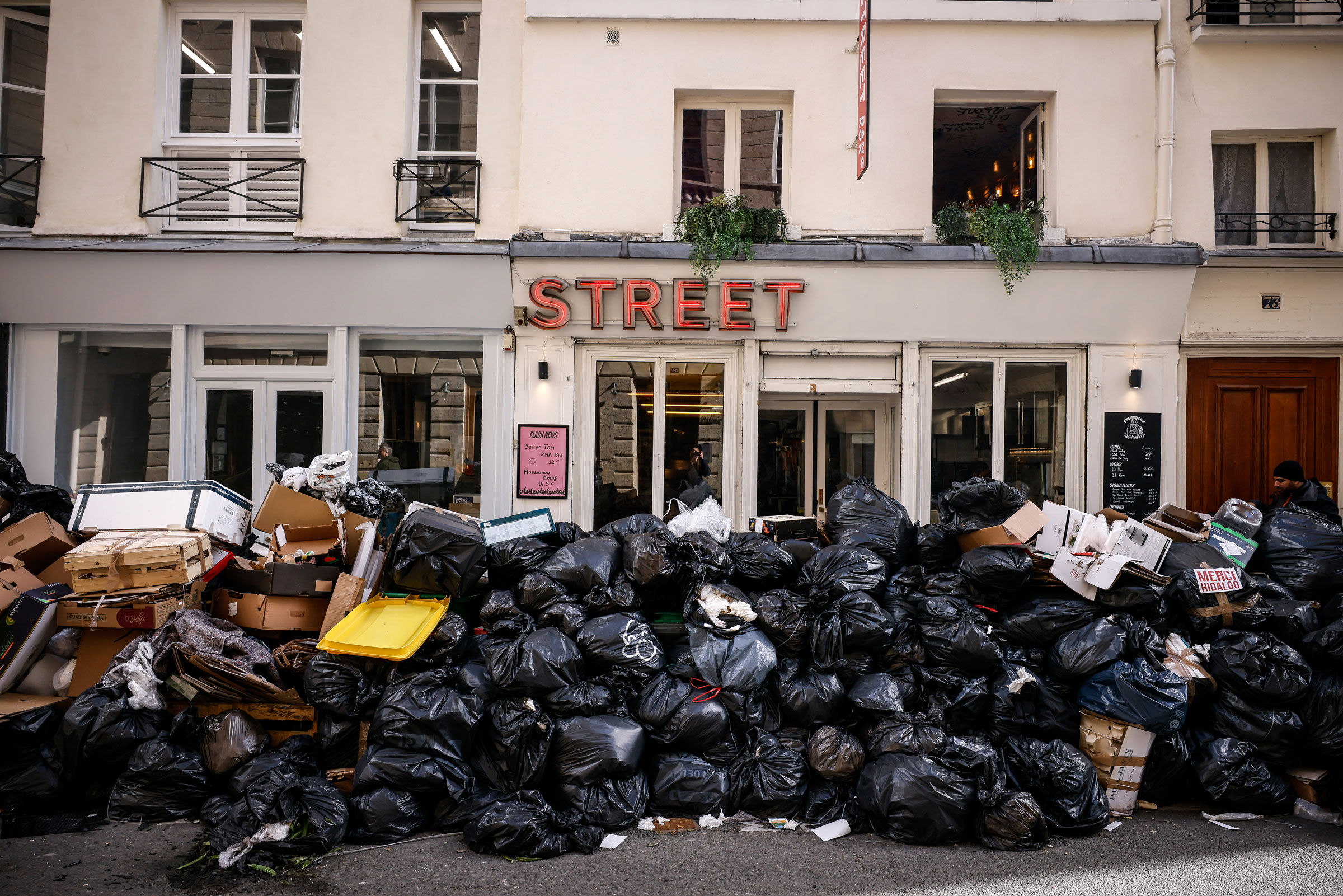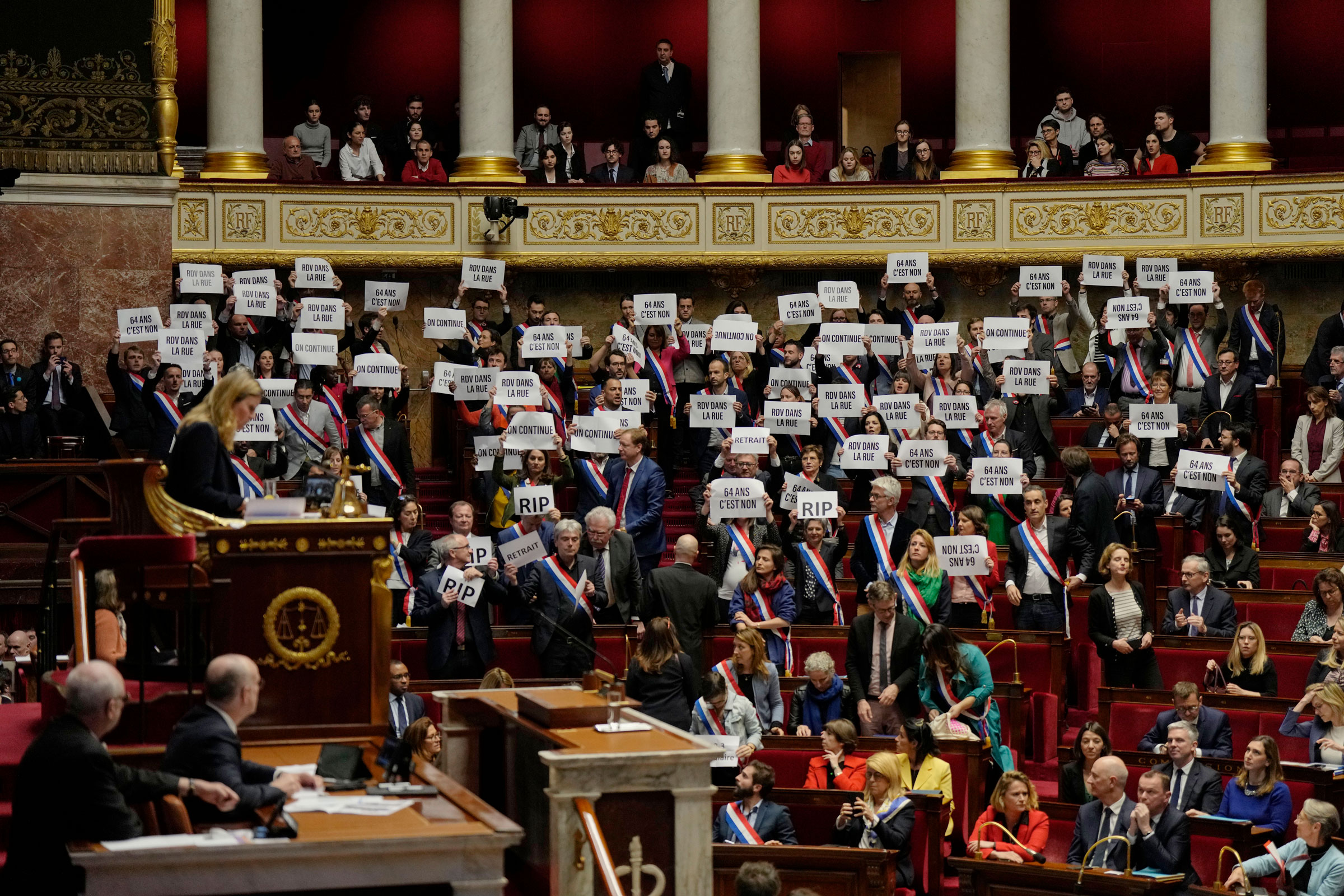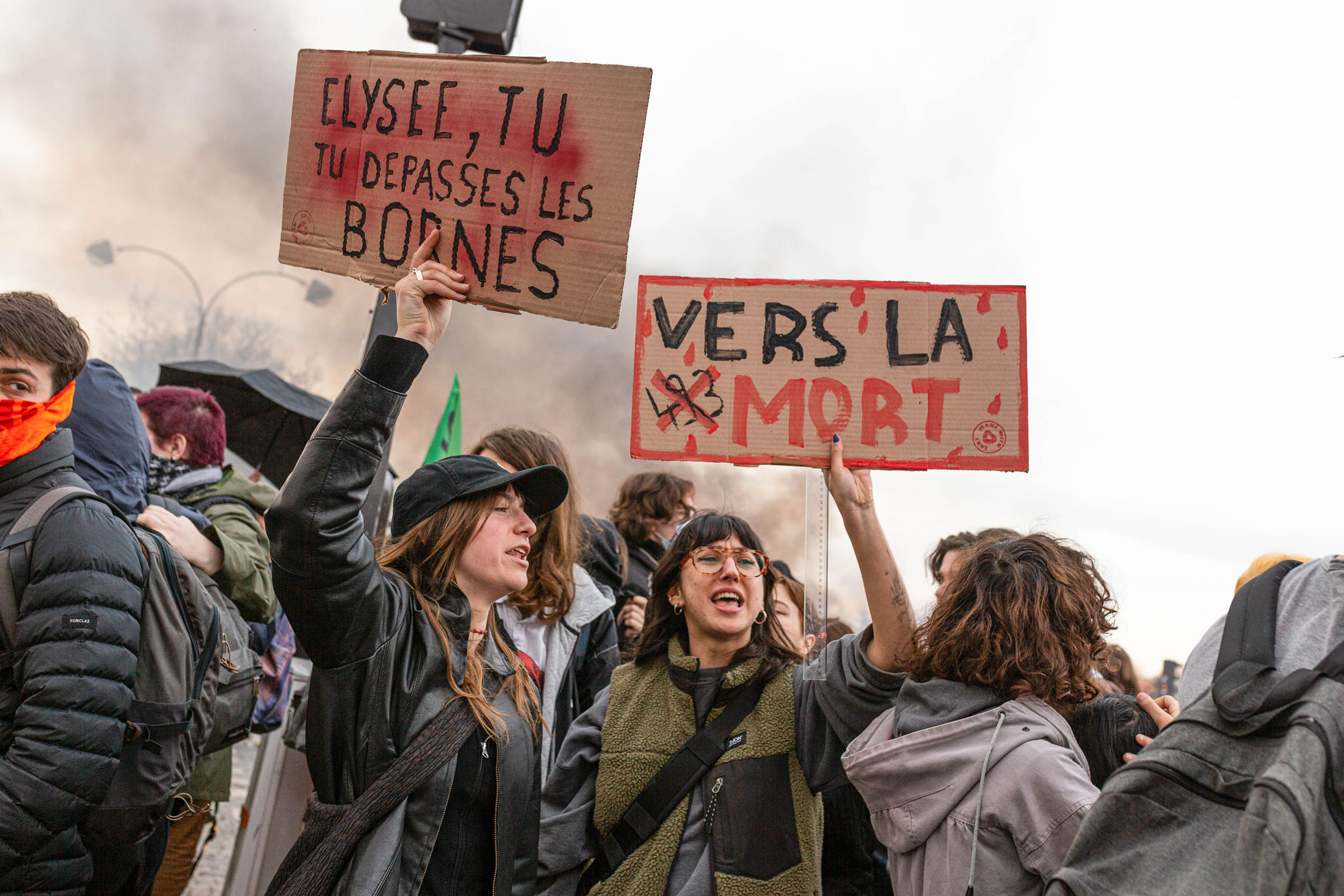Steps from the gilded domed tomb of Napoleon, on Paris’s Left Bank, about 100 union members gathered at a protest rally on Monday afternoon, to vent their rage once again, over a leader they accuse of ruling with a Napoleonic style of his own: French President Emmanuel Macron. After more than two months of strikes and violent protests that have rocked France, labor activists railed against Macron’s determined effort to ram through a law raising the retirement age from 62 to 64—a measure they say he has foisted on the country against its will.
“Macron’s image has deteriorated terribly from the beginning of this year,” says Patrick Belhadj, an official of the left-wing General Confederation of Labor, who represents railway workers in eastern Paris, hours before the President narrowly won a no-confidence vote in parliament. “He just presents decisions, and there is no discussion at all that is possible,” adds Belhadj, who says he voted for Macron’s reelection less than a year ago.
That lack of negotiation has pushed France into political turmoil ever since Macron unveiled his unpopular pension reform plan in mid-January. The turmoil reached a fever pitch in recent days, after Macron used the 49.3 constitutional clause to force through the legislation by executive decree, with more than 200 people arrested following spontaneous protests after the French leader survived Monday’s no-confidence vote.

Over the past two weeks, a strike by garbage workers has left mountains of trash festering on Parisian sidewalks, with growing alarm over a potential rat infestation. Schools have shut numerous times, as teachers have joined the protests. Impromptu demonstrations have exploded at least weekly into pitched battles against riot police, amid volleys of teargas.
Had Monday’s no-confidence vote succeeded in parliament, it would have forced the ouster of Macron’s hand-picked Prime Minister Élisabeth Borne, who has been in office for just 10 months, and is responsible for shepherding the President’s legislative plans through the National Assembly.
“I think his mandate is virtually over”
Macron, a former investment banker and French finance minister, has argued that France can no longer afford its generous retirement benefits, with an ageing population dependent on an ever-smaller proportion of working people. While the official retirement age is 62, many quit work earlier, assured of generous public benefits, including retirement packages that can begin years earlier, depending on one’s job. At the union rally on Monday, Laurence Naudin, 63, told TIME she had retired from a postal-service job at 52, and collects a monthly pension of €1,400 ($1,500).
Read More: Inside the Radical Effort to Clean Up the Seine
Previous attempts to reform pensions have failed, with politicians retreating in the face of fierce protests, and Macron has vowed not to repeat that pattern. The bill to raise the retirement age still faces a review by the Constitutional Council before it becomes law.
But while Macron won a narrow victory on Monday—the no-confidence vote was nine short of the 287 needed to topple the government—he is markedly weakened as a leader. (A separate no-confidence vote introduced Monday night by far-right representatives won just 94 votes.)

“I think his mandate is virtually over,” says Philippe Chevrolet-Moreau, a political communications expert at Paris’s Sciences Po University. “Even within his own party, there is strong doubt that anything of importance will get done,” he says. “The main fear now is not about retirement, or the pension reform. It is about democracy itself,” a reference to Macron wielding the 49.3 clause.
Despite a poll on Sunday that showed Macron with just a 28% approval rating, he retains all the enormous powers of a French President: The ability to command troops into battle, pick prime ministers and cabinet members, and set the budget for the world’s seventh-biggest economy. And having won his second five-year term last April, Macron will remain in the Elysée Palace, and on the world stage, until 2027.
“This is all leading to Marine Le Pen being elected”
Yet Macron’s approach to the unrest could add to the French leader’s recent difficulties. Broader legislative dockets, like immigration, investment, assistance for Ukraine, and climate, could all run into a wall of anger among lawmakers, many of whose own voters abhor Macron’s pension reform; recent polls show about 70% of French reject the change in retirement age.
That anger marks a major reversal of fortune for Macron, who swept into power in 2017 as the youngest French leader since Napoleon, obliterating two political parties that had ruled the country for generations. After interviewing him shortly after his stunning victory, TIME proclaimed him on its cover, “The Next Leader of Europe” with a bolded red asterisk warning: “If only he can lead France.” In a second TIME interview in 2019, after the explosive Yellow Vest protests, Macron said that he did not mind being vilified. “I was elected, I’m in charge, and I’m the leader, so I take it,” he said. “I don’t care.”

But union leaders and analysts say that the matter goes beyond Macron’s popularity—and might have greater long-term implications over who might succeed him in four years’ time. Many fear that the political upheaval since January has given huge momentum to Macron’s arch-enemy, the far-right Marine Le Pen.
As head of the National Rally (RN) party, Le Pen lost to Macron in the runoff presidential race last April. But Macron’s party lost its parliamentary majority two months later, while Le Pen’s RN emerged as a major figure with 89 seats. As Macron rolled out his retirement plan, Le Pen seized on the issue, telling the French it was discriminatory to blue-collar workers and women.
“This is all leading to Marine Le Pen being elected in 2027,” Chevrolet-Moreau said on Monday. “That is the only way I see.”
At Monday’s rally, Naudin, the retired postal-service employee, said she had voted for Macron in last year’s runoff round, to make sure Le Pen did not become President. Asked if she would do the same again, however, she hesitated. “If the election were held today, Marine Le Pen would win, unfortunately,” she says. “Macron has ruled without negotiations, without dialogue. And that has angered a lot of French.”
More Must-Reads from TIME
- How Donald Trump Won
- The Best Inventions of 2024
- Why Sleep Is the Key to Living Longer
- How to Break 8 Toxic Communication Habits
- Nicola Coughlan Bet on Herself—And Won
- What It’s Like to Have Long COVID As a Kid
- 22 Essential Works of Indigenous Cinema
- Meet TIME's Newest Class of Next Generation Leaders
Contact us at letters@time.com